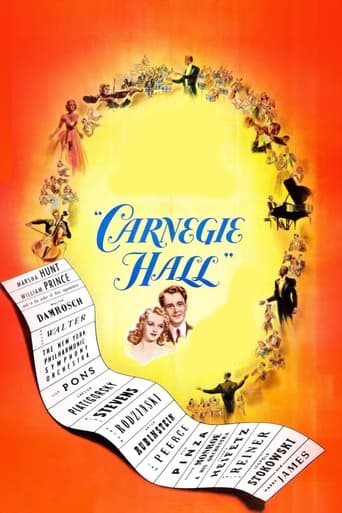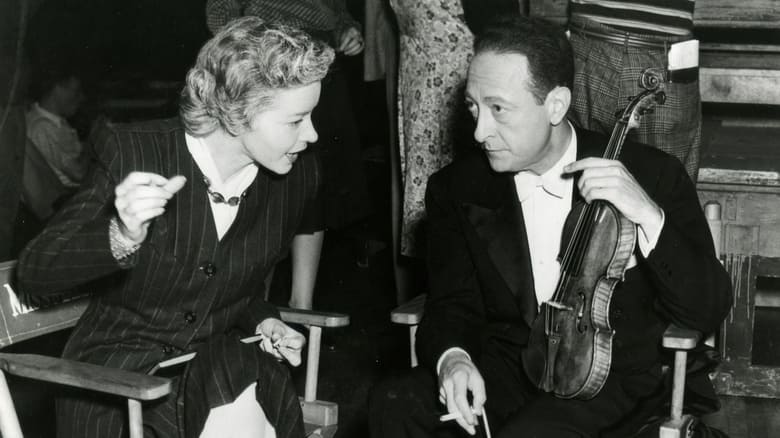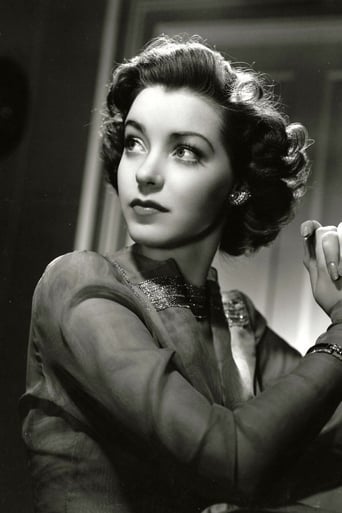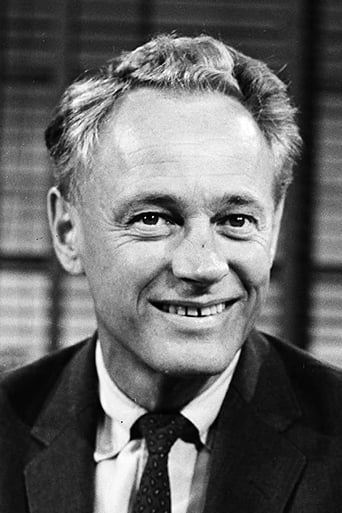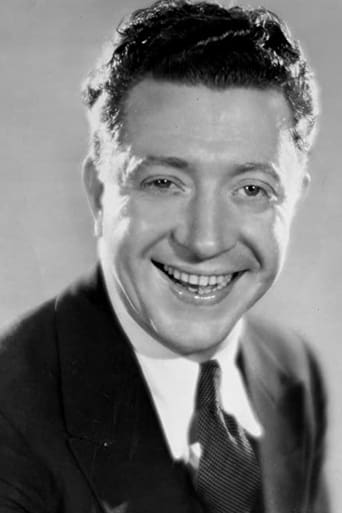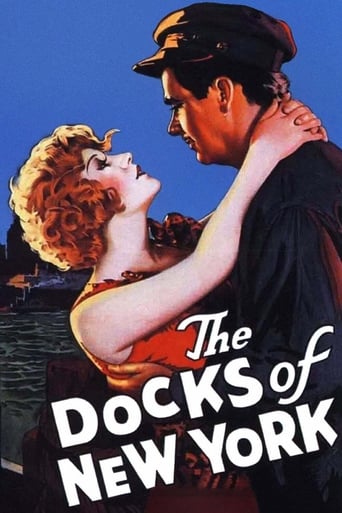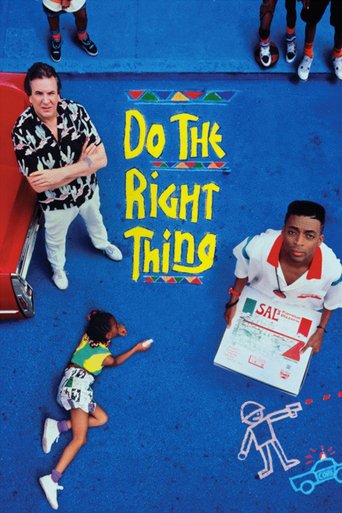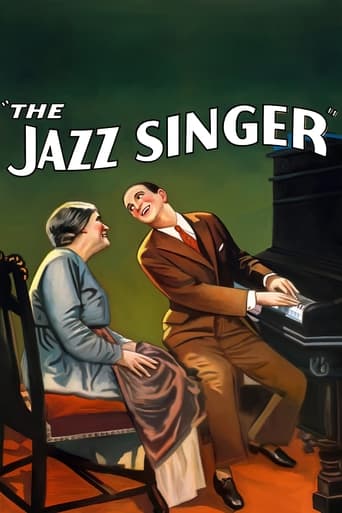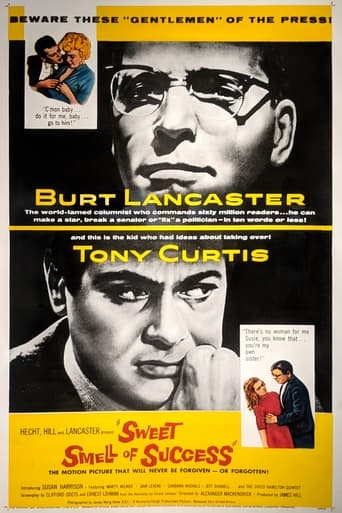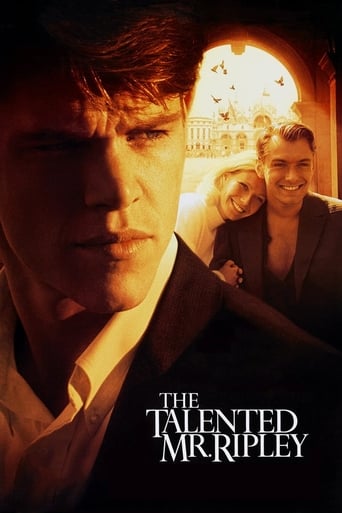Carnegie Hall (1947)
A young Irishwoman comes to the United States to live and work with her mother as a cleaning lady at Carnegie Hall. She becomes attached to the place as the people she meets there gradually shape her life. The film also includes a variety of performances from some of the foremost musical artists of the times: conductors Bruno Walter & Leopold Stokowski, solists Arthur Rubinstein & Jascha Haifetz, singers Lily Pons & Jan Peerce and bandleader Vaughn Monroe among many others.
Watch Trailer
Cast
Similar titles



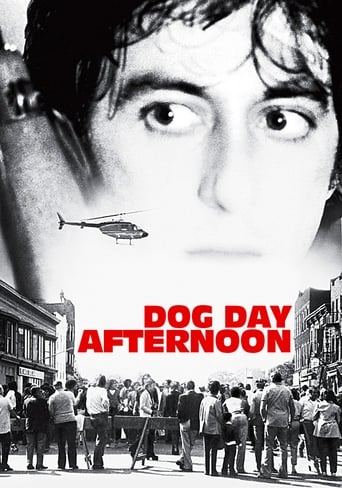
Reviews
Pretty Good
Crappy film
Better Late Then Never
The movie's not perfect, but it sticks the landing of its message. It was engaging - thrilling at times - and I personally thought it was a great time.
The meaning of the film gets drowned in the overwhelmingly good performances of the artists, and there are any number of them: they are all there, Artur Rubinstein, Jasha Heifetz, Gregor Piatigorsky, Leopold Stokowski, Bruno Walter, Artur Rodzinski, Fritz Reiner, Ezio Pinza, Lily Pons and even Tchaikovsky (vaguely discerned from some distance, impersonated, of course,) and although Marsha Hunt makes a good and touching performance as the mother who loses first her husband and then her son in the same way - getting lost making their own ways - the superficial acting of that story must drag the film down from the top levels of the performances. The key scene to the whole thing is however Jasha Heifetz' communication with Marsha, when he eloquently comforts her for all her grief better than anyone could have done.The personality of Jasha Heifetz is somehow the key to the whole problem, which is the alienation of the artist from an ordinary human life, which is what both the father and the son can't bear and rebel against. Jasha Heifetz was often considered inhuman in his seemingly callous attitude, and even in his acting here he gives a rather stiff and almost robot-like impression, but his words couldn't be warmer, and they could but come from the heart, which still beats down there under all the layers of superhuman professionalism and completely reconciles Marsha (Nora) with her fate. Edgar G. Ulmer made some very odd films in extremely different directions, there is one film about tuberculosis and another horror film with Boris Karloff and Bela Lugosi, which could be their best - and here he films music, and as a music film of music and about music it will certainly endure for all ages and continue to impress all lovers of real music.
This is a movie about a young man and his mother. She sacrifices everything so that he can study to be a classical pianist. He falls in love with big band music and decides to pursue that. His mother is heart-broken. In other words, one long, slow cliché that has been done better elsewhere.If that's all there were to this movie, I would say "forget it." But in between these scenes of melodrama there are live performances by some of the greatest classical musicians of the 1930s and 40s, indeed some of the greatest classical musicians of all times. Their performances, often truly great ones, are not wedged in in bits and pieces. Rather, we get to watch Arthur Rubinstein perform the entire Chopin Military Polonaise - and then de Falla's Ritual Fire Dance. We get to watch Jascha Heifitz perform the entire last movement of the Beethoven Violin Concerto - and with what fire! We get to wonder as Leopold Stokowski completely distorts the tempo markings for an entire movement of a Tchaikovsky symphony, producing a series of remarkable moments that, for this listener, never came together as a whole - but still, what daring to pull Tchaikovsky apart like that. Stokowsky and Rubenstein both remind us of an era when classical musicians were also stage performers. Rubenstein bangs away at the keyboard with fantastic arm gestures. Stokowski is very clearly conscious of the angle from which he is being filmed. These are spectacular musicians devoted to the music, yes, but these are also colossal, theatrical egos.We get to see Ezio Pinza stand there in a costume that would be grounds for a law suit, yet sing Don Giovanni's Brindisi like no one else - and the opening of Il lascerato spirto, from Verdi's Simon Bocanegra, the only musical fragment in the movie.I saw this - most of it - on TCM. It is evidently available on DVD. I hope the DVD recognizes the dual nature of the movie and has the tracks arranged so that one can skip over the melodrama and just enjoy the remarkable musical performances.
I saw this film when it first came out in 1947. at that time i was still learning to appreciate the great classical tradition. so this movie was an eye opener for me. i couldn't afford to go to concerts so here was an opportunity to see as well as hear some of the great icons of the classic world ie stokowski, walter, rodzinski, Rubinstein, heifetz, piatigorsky et al. yes it was a big thrill for me at the time. no less thrilling was to see Tchaikovsky himself in the opening scene, (as played by an actor of course.) the story line was purely secondary and was not to be taken seriously. this was the era ie the thirties and forties when you would occasionally hear some classical music in the movies. nelson eddy and Jeannette MacDonald for example would give some tid bits etc. it was also the time when the lives of composers such as Brahms, Schumann and Chopin were also being portrayed. a time when classical music was part of the everyday vocabulary albeit in somewhat truncated and simplified form. that now has all changed for some time and classical music is relegated to the limbos of the hoary past and is no longer part of our everyday. so this is a movie for classical music lovers or aspiring lovers of this seemingly defunct art.
Although the music segments are second to none (Rubenstein, Heifetz, Pinza, Lily Pons, Rise Stevens, and representing the more 'modern' era Harry James and the great Vaughn Monroe) the story, what little there is, is really dreadful. Nora is a selfish and pathetic person in whom we have little or no interest, her piano-playing son has the personality of a goldfish, and the film is the clunkier for them both. Tip - if you see this on video fast-forward to the musical bits. They are well worth it and amazingly, all still look great after 53 years!
